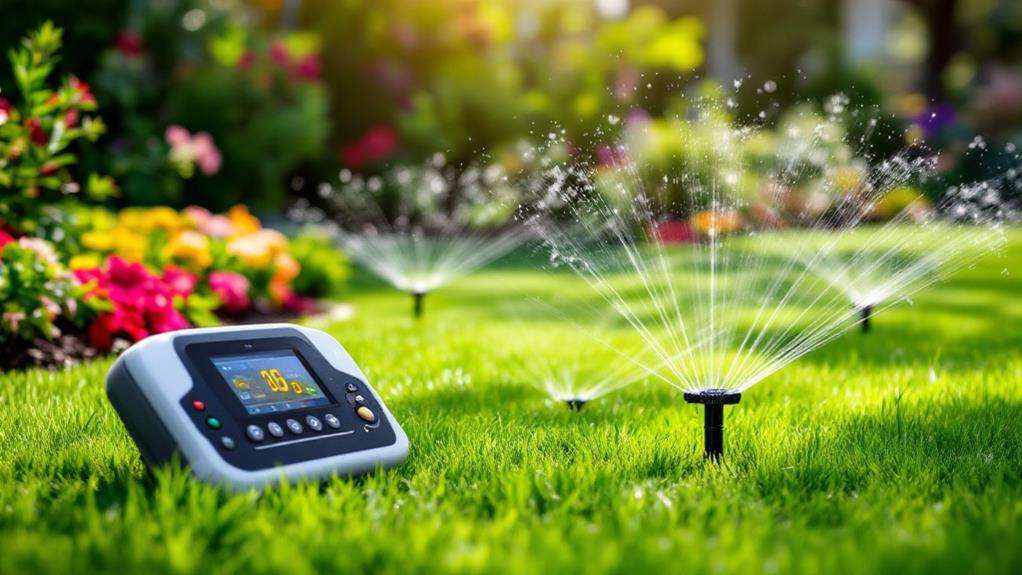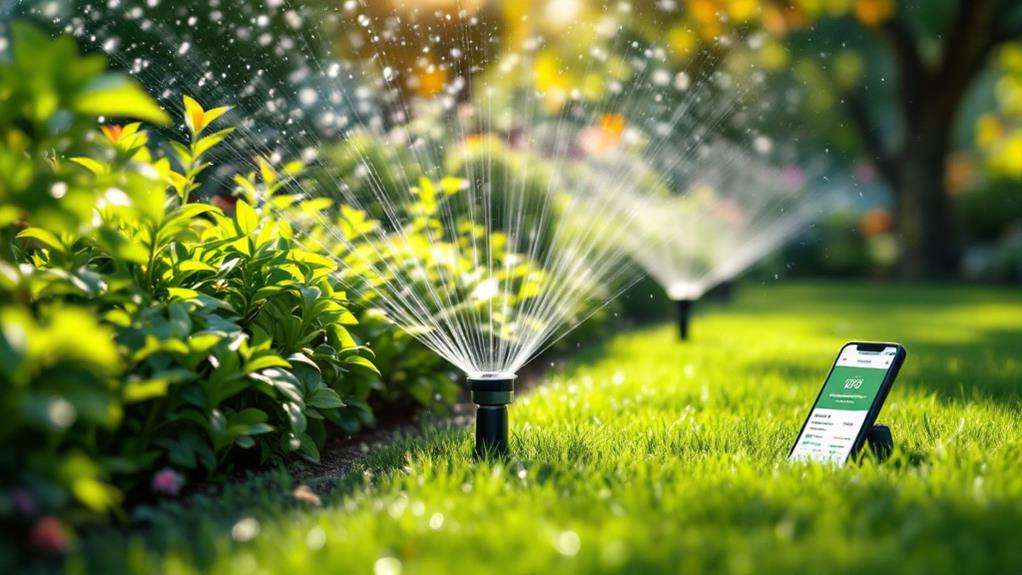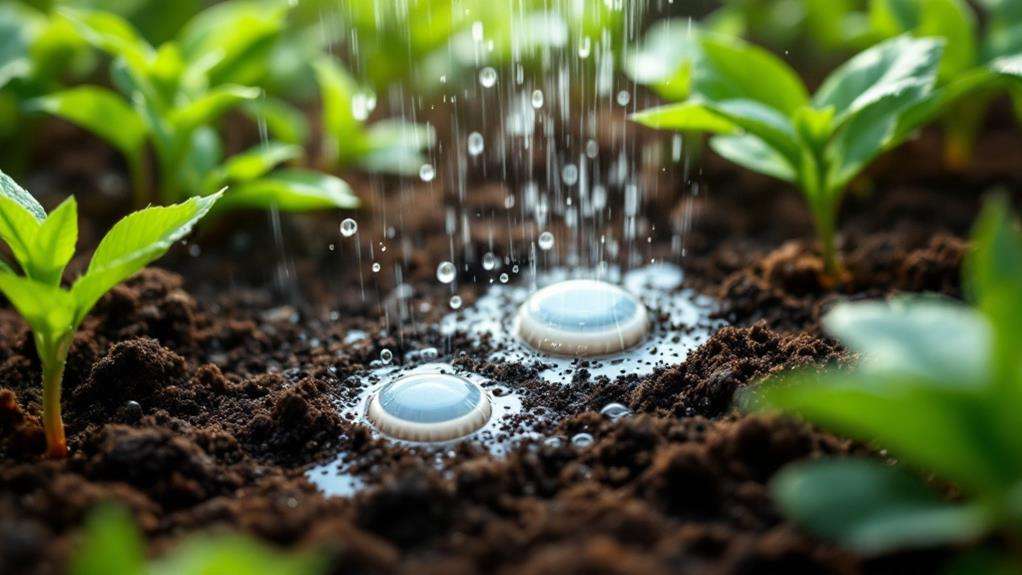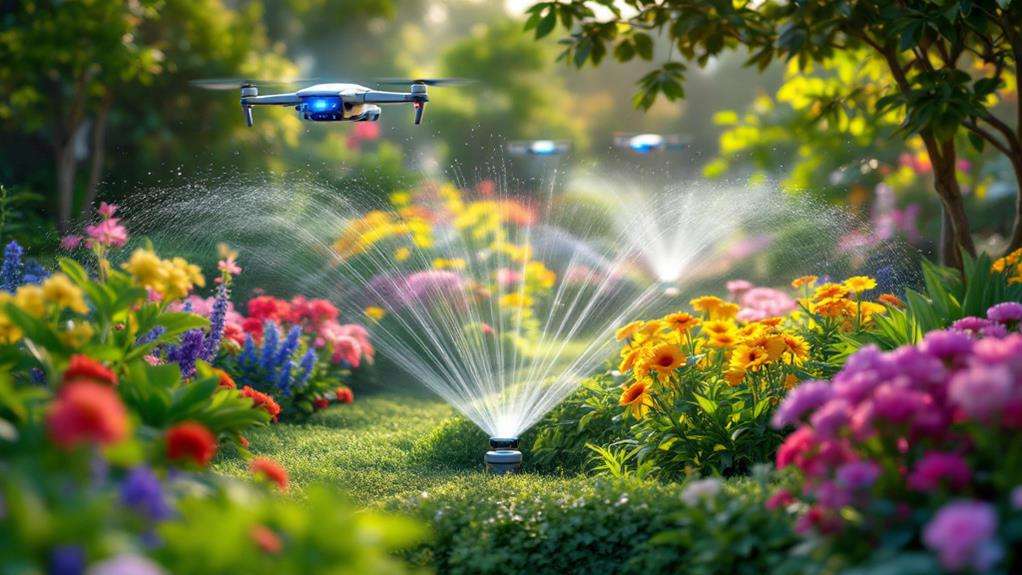Smart Irrigation Systems: The Future of Efficient Watering
Smart irrigation systems are revolutionizing water management for your lawn and garden. By using sensors, weather data, and automation, these systems can reduce your water usage by up to 50% compared to traditional methods. You'll benefit from precise soil moisture monitoring, customized watering schedules, and real-time data for informed decision-making. While there's a higher initial investment, you can expect a reasonable return within two years through lower utility bills and reduced maintenance. Smart irrigation not only saves water but also improves plant health and contributes to sustainable landscaping practices. The future of efficient watering is here, with even more exciting advancements on the horizon.
Understanding Smart Irrigation Systems
Smart irrigation technology is revolutionizing the way we water our lawns and crops. These advanced systems leverage a combination of sensors, weather data, and sophisticated algorithms to automate and optimize outdoor water use. You'll find that smart irrigation systems can considerably reduce your water consumption, potentially cutting it by up to 50% compared to traditional methods.
At the heart of these systems are smart irrigation controllers that adjust watering schedules based on real-time soil moisture levels and weather conditions. This adaptable approach to water management guarantees that your plants receive precisely the amount of water they need, when they need it. Integrated sensors and flow meters work together to distribute water accurately, preventing both over- and under-watering scenarios.
Water Conservation Benefits
Building on the advanced features of smart irrigation systems, let's investigate their substantial water conservation benefits. You'll be amazed to learn that these systems can reduce water usage by up to 50% compared to traditional methods. This significant reduction in water consumption not only helps preserve this precious resource but also leads to lower utility bills for you.
Smart irrigation systems excel at water conservation by precisely delivering the right amount of water to your plants when they need it most. You'll notice improved plant health as a result, and you'll contribute to reduced soil erosion in your environment. These systems require less maintenance than their traditional counterparts, saving you time and effort in the long run.
Perhaps one of the most impactful aspects of smart irrigation is the data-driven insights it provides. You'll gain access to information that enables long-term water management planning, allowing you to make informed decisions about your water use. By adopting smart irrigation technology, you're not only reducing your water consumption but also playing a pivotal role in promoting sustainable water conservation practices for the future.
Cost-Effective Smart Technology

Have you ever wondered how smart irrigation technology can be both eco-friendly and wallet-friendly? By using advanced technology, these systems offer a cost-effective solution for water conservation and land management. With a reasonable initial investment, you'll typically see a return within two years, making it a financially prudent decision.
Smart irrigation systems leverage utilize data to adjust watering patterns, utilizing:
- Intelligent algorithms
- Weather data
- Smart sensors
- Location-specific information
- Real-time monitoring
These state-of-the-art modern control systems use technology to optimize water usage, resulting in substantial utility bill cuts. By precisely adapting to your area's needs, they deliver significant savings on water consumption. But that's not all – you'll also save on fertilizer and pesticide costs due to improved watering efficiency and healthier plant growth.
The combination of water conservation, cost savings, and environmental sustainability makes smart irrigation a wise choice for current water management. You'll enjoy reduced utility bills while contributing to eco-friendly practices. With these systems, you're investing in a future where efficient watering meets financial sensibility, proving that being environmentally conscious can also be economically beneficial.
Remote and Automated Control
In today's fast-paced world, remote and automated control of smart irrigation systems has become a revolution. You can now manage your watering schedule from anywhere, using just your smartphone or computer. This remote access gives you unparalleled control over your landscape's health and water usage.
Smart irrigation systems employ real-time data to make automated watering adjustments. By integrating weather forecasts, these systems can delay or reduce watering when rain is expected, ensuring efficient water use without your intervention. You'll no longer need to worry about overwatering or wasting resources during rainy periods.
The streamlined maintenance process of these automated systems saves you time and effort. You can easily troubleshoot issues and monitor system performance remotely, reducing the need for on-site visits. This convenience allows you to focus on other aspects of property management while maintaining a healthy landscape.
With increased flexibility and control, you can optimize your water usage and landscape health. Whether you're a homeowner or property manager, smart irrigation systems with remote and automated control offer a practical solution for efficient watering in our increasingly connected world.
Flow Rate Management

Flow rate management forms the backbone of efficient smart irrigation systems. By effectively controlling water flow, you'll prevent wastage and guarantee your plants receive suitable hydration. Precise regulation of flow rate helps you avoid over- or under-watering, maximizing watering efficiency. Smart systems adapt to your plants' needs, intelligently managing water use to conserve resources.
Flow meters and valves work in tandem to control water distribution and monitor usage. This precise control not only optimizes irrigation but also reduces pollutant transportation and runoff, supporting an eco-friendly approach to gardening.
Key benefits of flow rate management in smart irrigation systems include:
- Improved water conservation
- Suitable plant health through precise watering
- Reduced environmental impact
- Lower water bills
- Customized watering schedules based on plant needs
Weather-Based Adjustments
Building on the precision of flow rate management, weather-based adjustments take smart irrigation systems to the next level. These advanced systems use real-time data to optimize your watering schedule, ensuring your landscape receives the right amount of water at the right time.
Smart technologies incorporate hyperlocal weather forecasts to make intelligent decisions about when to water. If rain is predicted, the system will automatically delay or suspend irrigation, making the most of natural precipitation. This not only saves water but also prevents overwatering, which can be harmful to your plants.
Sensors monitor essential factors like temperature, humidity, and wind speed. On hot, dry, or windy days, the system adjusts accordingly to prevent excessive water loss through evaporation. By integrating weather-based programming, your irrigation system adapts to changing climate patterns and seasonal variations, ensuring your plants always receive ideal care.
These weather-responsive features promote healthier plant growth while substantially reducing your water consumption and utility costs. You'll enjoy a lush, abundant landscape while minimizing your environmental impact, making smart irrigation systems a win-win solution for both you and the planet.
Soil Moisture Monitoring

Diving deeper into the heart of smart irrigation, soil moisture monitoring stands as a cornerstone technology. This innovative feature uses sensors to measure water content in the soil, providing you with real-time data that's essential for efficient watering. By monitoring soil moisture levels, you'll know exactly when and how much to water, preventing both over- and under-watering scenarios.
Smart irrigation systems analyze soil moisture trends to create predictive watering schedules. These schedules take into account upcoming weather conditions, ensuring your plants receive ideal care. Different plants have varying moisture requirements, and smart systems adjust accordingly to promote healthy growth. With precise soil moisture data, you'll deliver water only when and where it's needed, substantially reducing waste.
Real-time data for informed decision-making
Prevention of over- and under-watering
Customized watering based on plant type
Weather-adaptive irrigation schedules
Significant reduction in water waste
Challenges and Limitations
While smart irrigation systems offer numerous benefits, they're not without their obstacles. You'll need to assess the higher initial investment compared to traditional watering methods. Although these systems can lead to long-term cost savings through efficient water use, the upfront expenses might be a hurdle for some.
You'll also face technical challenges. Smart irrigation systems rely on internet connectivity and a stable power supply to function in an optimal manner. If you live in an area with unreliable internet or frequent power outages, you may not reap the full benefits of these advanced systems. Additionally, you might encounter compatibility issues with your existing plumbing and electrical infrastructure, potentially requiring additional modifications.
Installing and configuring a smart irrigation system isn't a simple DIY project. You'll need technical knowledge to guarantee proper setup and integration with your landscape. Even after installation, you'll need to monitor the system carefully. User error can lead to over- or under-watering if you don't correctly interpret the data provided. While these systems can considerably improve your water management, they require ongoing attention and adjustment to maximize their effectiveness and achieve the promised water and cost savings.
Future Advancements

Smart irrigation systems are continuously changing, with exciting advancements on the horizon. You'll soon see Artificial Intelligence and Machine Learning playing a bigger role in optimizing water usage and adapting to environmental changes. These technologies will work hand-in-hand with improved Sensor Technology, allowing for more precise watering at the individual plant level.
The future of smart irrigation isn't just about watering; it's about integration and sustainability. You'll find these systems becoming part of larger smart home and building automation networks, offering a more thorough approach to water management. Additionally, renewable energy sources will increasingly power these systems, making them more environmentally friendly.
You can expect the following in the coming years:
- AI-driven irrigation optimization
- Plant-level precision watering
- Integration with smart home systems
- Solar and wind-powered irrigation infrastructure
- Advanced data analysis for long-term planning
These advancements will revolutionize how you manage water resources. You'll have access to deeper understandings through improved data visualization, guiding your long-term irrigation strategies. As these technologies evolve, you'll see smart irrigation systems becoming more efficient, sustainable, and easier to use, ultimately leading to better water conservation and healthier environments.
Implementing Smart Irrigation
Implementation of smart irrigation systems begins with an all-encompassing assessment of your property's unique needs. You'll need to consider factors like soil type, plant varieties, and local climate conditions to optimize watering efficiency. Once you've gathered this information, you can select the appropriate smart irrigation components, including sensors, controllers, and weather data integration systems.
Installing these advanced systems may require professional assistance, but the advantages are substantial. You'll see a significant reduction in water use, potentially up to 50%, while improving soil infiltration and reducing runoff. The initial investment is reasonable, with a return on investment typically achieved within two years, making it a financially sound decision for water conservation.
After installation, you'll enjoy the convenience of remote system management and automated watering adjustments based on real-time weather data. Smart irrigation systems also regulate flow rates intelligently, preventing water wastage and ensuring ideal plant watering. By implementing this technology, you're not only conserving water but also contributing to a more eco-friendly approach to landscape management. Adopt smart irrigation to optimize your watering practices and reduce your environmental impact.
